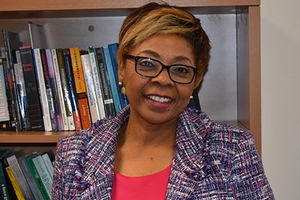Environment
'It Wasn't the Water or the Wildlife, It Was the People'

On March 8, Mamie Parker, former chief of staff and head of fisheries at the U.S. Fish and Wildlife Service, will receive the William K. Reilly Award from American University School of Public Affairs' Center for Environmental Policy.
Parker is a pioneer environmentalist. She is the first African-American appointed to the Senior Executive Service in the Fish and Wildlife Service. However, her passions and identity go far beyond titles. Mamie is also a fisheries biologist, a community organizer, a civil rights activist, and a conservationist.
Parker grew up near the banks of the Bartholomew Bayou and Lake Enterprise in southern Arkansas and northern Louisiana in the 1960s. Her interest in fisheries began as a result of her large family's heavy reliance on fishing local waterways for food sources. When she was a young girl, Mamie's discovery of the presence of mercury pollution in the water instilled in her a curiosity about and motivation to protect the environment.
"Over time I realized it wasn't the water or the wildlife, it was the people," said Parker. "I learned not to touch what's logical in their head but what's in their heart. If you can change how people feel about policy in their heart, you can make them care."
Parker has worked throughout the United States in Wisconsin, Minnesota, Missouri, Georgia, Massachusetts, and the District of Columbia. She helped create the National Fish Habitat Action Plan in partnership, for which the President of the United States presented her with the Presidential Rank Award, given only to the top 1 percent of all government employees. She assisted with the National Environmental Policy Act, Section 404 of the Clean Water Act, federal water resource development planning, invasive species protection, environmental contaminants coordination, marine mammal conservation, national wetland inventory, and coastal barrier mapping.
"As I look back, I really believe being a woman gave me the skills to be flexible, a good listener, a nurturer, a consensus builder, and also a survivor," said Parker. "You use what you learned in school and you learn to observe wildlife and fish, and soon you find yourself using those same skills watching people."
Parker also acknowledges that being a woman in a male-dominated field at that time was not easy.
"A big challenge was working with mostly men for much of my career," said Parker. "I also realized that because of this, I was a role model. I want to continue to do my part and help clear the path for other women as well."
Parker's communication and leadership skills are evident in the multitude of roles and honors she has received. As an Aspen Institute fellow, she was selected for the Council of World Women Leaders exchange program in southern Africa. As Northeast regional director for the Department of Interior, she served as the lead negotiator between the department and General Electric during the cleanup of the Hudson River. She coauthored an American Fisheries Society (AFS) book titled "The Future of Fisheries." In addition, the AFS awarded her the Emmaline Moore Award, named for the society's first female president.
Parker's community involvement and leadership also run deep. She is a board member of the Student Conservation Association and a Virginia Trustee of The Nature Conservancy. Parker serves on the boards of directors of Brown Advisory Investment, Marstel Day Conservation Consulting, the National Wildlife Refuge Association, the Defenders of Wildlife, the Potomac Conservancy, and the Chesapeake Conservancy. She is also a member of Rotary Club International, Alpha Kappa Alpha Sorority Inc., and the Links, among many more.
The Reilly Awards take place March 8 at 6 p.m. in AU's Constitution Hall. To register, visit https://american.swoogo.com/2018Reilly.